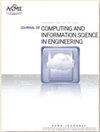Reflect-Express-Transform: Investigating Speech-Based Iterative Digital Design for Young Designers
IF 2.6
3区 工程技术
Q2 COMPUTER SCIENCE, INTERDISCIPLINARY APPLICATIONS
Journal of Computing and Information Science in Engineering
Pub Date : 2023-03-29
DOI:10.1115/1.4062230
引用次数: 0
Abstract
We investigate speech-based input as a means to enable reflective thinking for younger individuals (middle - and high-school students) during design iterations. Verbalization offers a unique way to externalize ideas in early design and could therefore lead to new pathways for exploration and iteration, especially for K-12 students who possess the creative potential but are not technically trained in the design process. Interactive design systems, however, by-and-large utilize sketching, multi-touch, and gestural inputs. As a result, (1) there is little know-how regarding how to operationalize verbal inputs as a meaningful way to facilitate idea exploration and (2) there is little fundamental understanding of the underlying cognitive mechanisms for iteration through verbal communication. We take the initial steps towards these gaps by first designing and implementing the ShapOrator interface that takes verbal descriptions of geometric parameters (shape, size, instances) in a semi-natural language form and determines the appropriate transformations to a given design artifact modeled as a shape assembly. Using ShapOrator as our experimental setup we conducted an in-depth observational study on 10 middle - and high-school students tasked with designing spaceships. Our study revealed that participants were able to create a variety of designs while associating functional and topical contexts to their spaceships throughout the design iteration process.反思-表达-转换:青年设计师基于语音的迭代数字设计研究
我们研究了基于语音的输入作为一种手段,使年轻人(中学生和高中生)在设计迭代期间能够进行反思性思考。语言化在早期设计中提供了一种独特的方式,可以将想法外化,因此可以为探索和迭代带来新的途径,特别是对于那些拥有创造潜力但没有在设计过程中接受过技术培训的K-12学生。然而,交互设计系统基本上利用素描、多点触控和手势输入。因此,(1)关于如何将言语输入作为一种有意义的方式来促进思想探索的知识很少;(2)对通过言语交流进行迭代的潜在认知机制的基本理解很少。我们通过首先设计和实现ShapOrator接口来实现这些差距的初始步骤,该接口以半自然语言形式对几何参数(形状、大小、实例)进行口头描述,并确定对建模为形状组装的给定设计工件的适当转换。我们使用ShapOrator作为实验装置,对10名设计宇宙飞船的中学生进行了深入的观察研究。我们的研究表明,在整个设计迭代过程中,参与者能够创建各种各样的设计,同时将功能和主题上下文与他们的宇宙飞船联系起来。
本文章由计算机程序翻译,如有差异,请以英文原文为准。
求助全文
约1分钟内获得全文
求助全文
来源期刊
CiteScore
6.30
自引率
12.90%
发文量
100
审稿时长
6 months
期刊介绍:
The ASME Journal of Computing and Information Science in Engineering (JCISE) publishes articles related to Algorithms, Computational Methods, Computing Infrastructure, Computer-Interpretable Representations, Human-Computer Interfaces, Information Science, and/or System Architectures that aim to improve some aspect of product and system lifecycle (e.g., design, manufacturing, operation, maintenance, disposal, recycling etc.). Applications considered in JCISE manuscripts should be relevant to the mechanical engineering discipline. Papers can be focused on fundamental research leading to new methods, or adaptation of existing methods for new applications.
Scope: Advanced Computing Infrastructure; Artificial Intelligence; Big Data and Analytics; Collaborative Design; Computer Aided Design; Computer Aided Engineering; Computer Aided Manufacturing; Computational Foundations for Additive Manufacturing; Computational Foundations for Engineering Optimization; Computational Geometry; Computational Metrology; Computational Synthesis; Conceptual Design; Cybermanufacturing; Cyber Physical Security for Factories; Cyber Physical System Design and Operation; Data-Driven Engineering Applications; Engineering Informatics; Geometric Reasoning; GPU Computing for Design and Manufacturing; Human Computer Interfaces/Interactions; Industrial Internet of Things; Knowledge Engineering; Information Management; Inverse Methods for Engineering Applications; Machine Learning for Engineering Applications; Manufacturing Planning; Manufacturing Automation; Model-based Systems Engineering; Multiphysics Modeling and Simulation; Multiscale Modeling and Simulation; Multidisciplinary Optimization; Physics-Based Simulations; Process Modeling for Engineering Applications; Qualification, Verification and Validation of Computational Models; Symbolic Computing for Engineering Applications; Tolerance Modeling; Topology and Shape Optimization; Virtual and Augmented Reality Environments; Virtual Prototyping

 求助内容:
求助内容: 应助结果提醒方式:
应助结果提醒方式:


